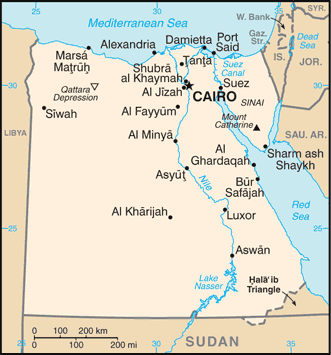
Why the U.S. Should Pay Attention to the Sinai Insurgency
After the fall of Hosni Mubarak in 2011 Egyptian security in the Sinai Peninsula evaporated. This left a vacuum for radical Bedouins to take revenge after decades of repression from the Egyptian Department of Interior. Years of widespread arrests, mass detention, and allegations of torture, have led radicals to violently oppose any form of Egyptian government and military forces. Since then, police stations, border guards and government buildings have been the target of a variety of attacks. The Sinai’s close proximity to strategic global trade routes, energy infrastructure, and the Israeli border gives the United States and other actors plenty of reasons to pay close attention to the region’s instability.
Established as a buffer zone in the 1979 Peace Treaty between Egypt, Israel, and the United States, the Sinai Peninsula has been a geographic staple maintaining peace in the region’s fragile security environment. This region, at the crux between Africa and the Middle East, is known for its black market activity and transnational crime including narcotics, weapons, and human trafficking. Egypt must abide by the personnel and equipment limits set by the Multinational Force & Observer treaty. The recent violence, spurred by years of repression and fueled by weapons flow from Libya, is a top security threat on the minds of Israel as well as the incoming Egyptian government.
The Sinai Peninsula’s coast falls along the Mediterranean, the Suez Canal, and the Gulf of Aqaba – all strategically important for regional and global shipping. Eight percent of global trade ships through the Suez Canal alone, including 3 percent of worldwide oil supplies. Violent attacks on border guards and soldiers occur almost daily as security forces struggle to maintain stability.
A terrorist group in the Sinai, known as the Furqan Brigade, shot rocket-propelled grenades at vessels traveling along the Suez Canal in 2013. The trans-Sinai natural-gas pipeline, which provided energy to Israel, has been subject to a series of attacks. One of the largest terrorist’s organizations in Sinai, Ansar Bayt al-Maqdis, shot down an Egyptian helicopter last January, killing five soldiers. In 2011 Israel deployed military units in the region to chase out a militant group responsible for an attack on Israeli territory. And al-Qaeda inspired bombings has even reached Cairo, including the assassination attempt on Interior Minister Mohamed Ibrahim in September 2013.
Fortunately, Egyptian military analysts believe the radicals have not formed a unified insurgency, but violence and unrest remain extremely problematic. According to Zack Gold, a Middle East policy analyst, during the American Security Project’s al-Qaeda 3.0 panel discussion, insurgents are currently only targeting the Egyptian state, waging economic warfare against what they see as an illegitimate government. He also noted that 700 soldiers, border guards, and civilians have been killed since 2011, 500 of which occurred in the past year alone. Mr. Gold believes there are 4 factors that contribute to the increased level of terrorism in the Sinai: (1) security forces melting away after the fall of Mubarak in 2011, (2) recent jailbreaks throughout the country including hardened Salafi Jihadists who have returned to Sinai, (3) the release of detainees under Morsi and the Supreme Council of the Armed Forces and, (4) the Libyan uprising which is responsible for an increase in weapon smuggling throughout the region.
Israel and Egypt have improved their security coordination over the past year in an attempt to prevent future attacks and maintain the sanctity of the peace treaty, but violent attacks are still occurring at an alarming rate. The United States has an interest in providing security to international shipping routes, our Israel ally, and supporting the Egyptian military as they struggle to return stability to the Sinai Peninsula. Coordination and assistance between the United States and Egypt is mutually beneficial, and will increase the effectiveness of such a campaign to eradicate terrorism in the Sinai.





